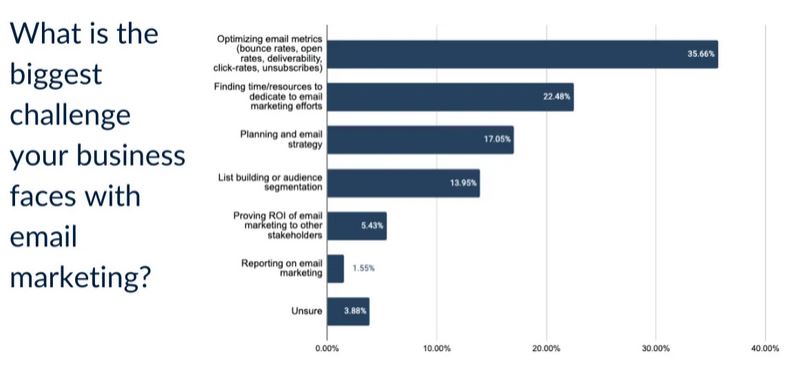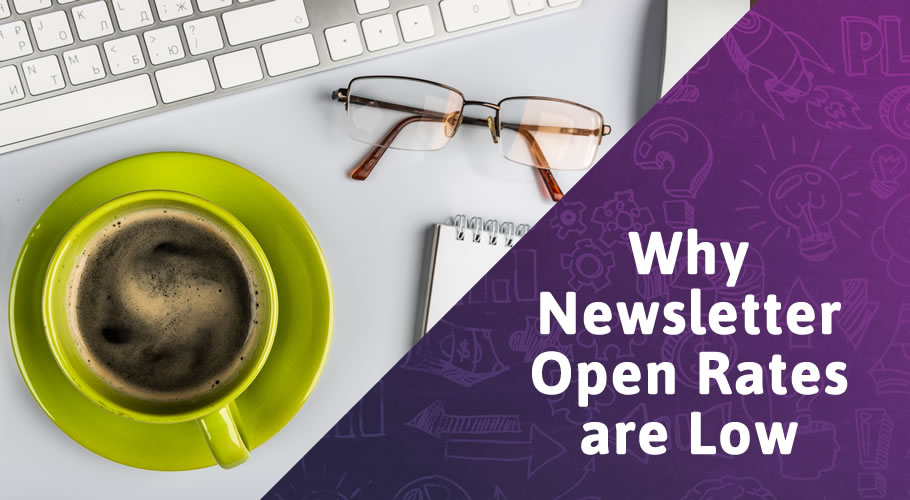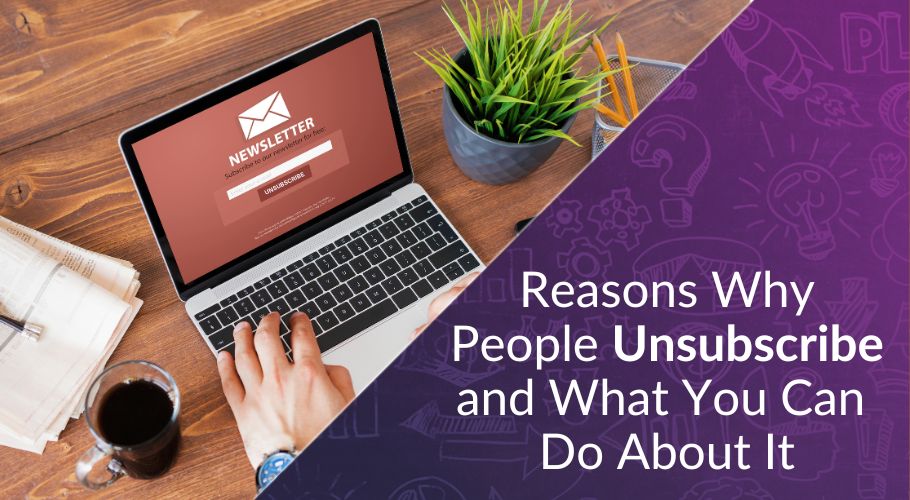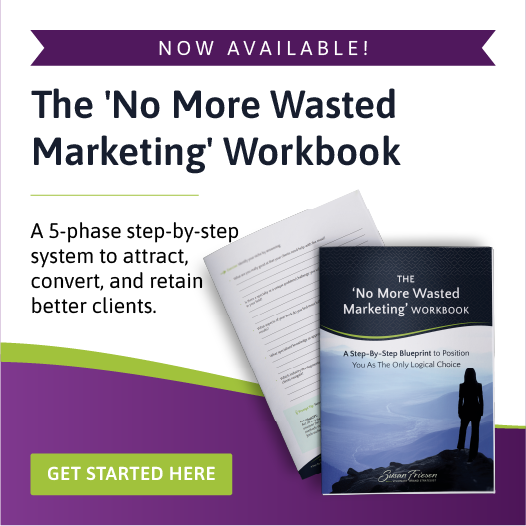As a business owner, your mailing list is one of your most valuable resources.
This list of subscribers is essential to the success of your marketing efforts, as it offers a fast, affordable way to stay connected to your audience.
But when you send a newsletter and see that several people have unsubscribed, it can be incredibly unsettling.
When this happens, you’ll be wondering, “Why am I losing subscribers?” and you may even find yourself asking, “What’s wrong? Don’t they love me anymore?”
But you really shouldn’t take this personally.
Because in the world of email marketing, this is all too common.
For instance, as you can see from the graph below, a survey from Service Direct, which polled hundreds of small business marketers, found that the biggest challenge for email marketers is optimizing metrics, like unsubscribes.

All things considered, if people are unsubscribing from your newsletter, you’re definitely not alone, and it’s not always a bad thing.
For one thing, as much as you may want them to be, everyone is not going to be your customer.
What’s more, when someone unsubscribes, they’re saying “This isn’t for me.”
And that’s a good thing.
Because it’s better to have a small list of loyal subscribers than a long list of unresponsive ones.
Plus, doesn’t it feel good to get rid of all the tire kickers?
After all, your goal should be to create a tight list of raving fans who love, trust, and want to buy from you, not to amass subscribers regardless of whether they’re interested in what you have to offer.
That being said, if you’re losing newsletter subscribers, and you want to learn why this is happening, and what you can do about it, then take a moment and keep reading.
Read: One Big Reason Your Newsletter Open Rate is Low and What to do About it

Understanding why people aren’t opening your newsletters is just as important as understanding newsletter unsubscribes.
Like it or not, the success of your email marketing requires deep insight into these metrics and many others.
With that in mind, this article explains the importance of subject lines, as they relate to email open rates, and explores the reasons why your subscribers may be ignoring your newsletter.
Why Am I Losing Subscribers?
There are many reasons why people would choose to unsubscribe from your newsletter.
Sometimes, after people get an email or two from you, they find out that they’re just not aligned with you and your brand.
Or they don’t agree with your point of view on something.
Or maybe your content isn’t providing the type of information they’re looking for.
Moreover, many people will just sign up for your newsletter to get whatever sort of freebie you’re offering, regardless of whether they have an interest in your products or services.
And if they’re just interested in seeing what they can get for free, or they’ve unsubscribed for any of the reasons above, then you can pretty much guarantee they’re not your ideal customer.
But many other things can inspire your audience to remove themselves from your mailing list, aside from what I’ve already discussed.
So, if you’re asking yourself, “Why am I losing subscribers?” these common reasons for unsubscribing should help you figure it out:
1) You’re Emailing Too Often
Most subscribers are expecting one or two emails from you a week at the absolute max.
With that in mind, if you suddenly start sending four emails per week, people will undoubtedly find it annoying and as a result, many of them will unsubscribe, and some may even mark you as spam.
So, if you want to stop this sort of thing from happening, make sure to avoid sending your subscribers more than two emails per week.
2) You’re Emailing Too Infrequently
If you send emails sporadically or very infrequently, people will likely forget who you are, and start asking themselves, “Who is this? And how did I get on this list?”
And when people start asking those questions, it’s not long before they hit the unsubscribe button.
That being said, while emailing too often is definitely a no-no, you should also make sure you’re reaching out often enough that your audience won’t simply forget you exist.
It might take a while to find that sweet spot, but in any case, you should try to send the same number of emails each week or month, and schedule them to go out on the same days of the week and at the same times, if possible.
3) They Don’t Remember Signing Up
If you’re offering a freebie in exchange for newsletter sign-ups, you’ve got to make sure it’s absolutely clear that users are also going to be added to your weekly newsletter.
Again, you don’t want them wondering “Why am I getting this?”
One of the best things you can do to prevent this from happening is to add an opt-in confirmation to your campaign, which is a process where users must verify their email addresses by clicking on a confirmation link in an email they receive after they subscribe.
This not only helps to ensure they don’t forget they signed up but also prevents your emails from being mistaken as spam and ensures you’ve gotten subscribers’ consent to contact them.
4) You’re Too Salesy
When people subscribe to your newsletter, regardless of what they’re getting in return, chances are, they’re not looking for a sales pitch.
More likely, what they’re looking for is answers to their questions, content that addresses their problems and pain points, and other useful information that can enhance their lives.
Having said that, you should make sure to avoid being too salesy, as it’s just going to annoy people.
It’s okay to promote your products or services to your audience every once in a while, or include some calls to action in your newsletter or articles.
But you have to find the right balance between free valuable information and promotional materials.
Because if people feel like all you do is try to sell them stuff, then that’s not what they signed up for, and as a result, they’ll be more likely to unsubscribe.
5) Your Newsletters Aren’t Relevant
Regardless of what industry you’re in, if you want your email marketing efforts to be successful, you’ve got to understand the wants, needs, problems, and pain points of your audience.
This will allow you to understand what your audience is expecting from you, speak to that audience in a way that deeply resonates with them, and ensure your newsletters are directly relevant to the people who are reading them.
For instance, if you send out a newsletter for work-at-home moms, they’re not looking for articles about potty training because that’s not relevant to them.
They signed up for your newsletter to get tips on working from home, growing their business, or boosting their income, not how to raise their children.
So, you should make sure to think long and hard about what you’re including in your newsletters, and whether or not it will be of value to your subscribers.
Because if you’re not giving them what they thought they signed up for, it’s only a matter of time before they unsubscribe.
6) Your Newsletters Don’t Display Properly
In today’s world, the majority of your audience will probably be using smartphones and tablets to check their emails.
And if your newsletter doesn’t display properly on these devices, they may end up unsubscribing.
That being said, you should make sure to send your newsletter out in both its plain text and HTML forms.
This way, even if a subscriber’s email client can’t display all your beautiful imagery, they can still read the textual version of your email.
Furthermore, you should always send a test email and check it on all your devices (preferably phone, tablet, and PC) to see how it displays, so you can make any necessary adjustments before it goes out to your entire list.
Tips for Reducing Email List Unsubscribes
Now that you have a better understanding of why people unsubscribe from email lists, you’re probably just itching to learn what you can do to stop this from happening.
With that in mind, below I’ve provided several tips for reducing email list unsubscribes:
Segment Your Audience
One thing you can do to reduce the number of unsubscribes you’re getting is to segment your subscribers based on their interests, demographics, or behaviour.
This allows you to send targeted content to specific segments, which has been shown to increase relevance and engagement, reducing the likelihood of unsubscribes.
Provide Valuable Content
Quality content is what builds trust and keeps subscribers engaged.
And that means ultimately, the value of your content will be the deciding factor in whether or not your newsletter succeeds.
So, make sure your newsletter contains valuable and relevant content that solves subscribers’ problems and fulfills their needs, while also sharing industry insights, tips, how-to guides, or exclusive offers that you know will resonate with your audience.
Personalize Your Content
You can use data on things like past purchases, browsing history, or survey responses to personalize your newsletter for each of your subscribers.
Personalization fosters a sense of connection and makes subscribers feel valued, as it allows you to address them by name and tailor content based on their preferences, making it less likely that they’ll unsubscribe.
Optimize Email Frequency
If you want to avoid annoying your subscribers, you’ve also got to find the right balance between staying top-of-mind and stuffing their inboxes.
To do that, you should monitor engagement metrics like open rates and click-through rates to determine the optimal frequency for sending your newsletters and then test different frequencies to see what works best for your audience.
Use Compelling Subject Lines
If you want people to open your emails, you’ve got to craft attention-grabbing subject lines.
Otherwise, your emails may get buried before anyone even notices them.
You can do this by experimenting with different formats, such as questions, lists, or urgency-based phrases, to pique curiosity and inspire people to open your emails.
But make sure to avoid clickbait tactics, as they may lead to more unsubscribes.
Optimize the Design of Your Emails
No matter what your newsletter is about, your emails should align with your brand while being visually appealing and mobile-responsive, which means they’ll adapt to different screen sizes and look great on any device.
In any case, make sure to use a clean layout, eye-catching images, and clear calls to action to guide subscribers’ attention, so you can make it easy for them to consume your content and take the kind of action you want them to take.
Respect Subscribers’ Preferences
You should allow subscribers to customize their email preferences, including the frequency and content types they prefer.
Offering the option to opt down rather than opt out completely by choosing to receive fewer emails, for instance, respects subscribers’ preferences, reduces frustration, and encourages them to stay subscribed.
Set Clear Expectations
You also want to make sure you’re setting clear expectations during the sign-up process regarding the type and frequency of emails that subscribers will receive.
So, make sure to avoid surprises by only delivering what you promised and maintaining consistency in your communications.
This kind of transparency builds trust and reduces the likelihood of unsubscribes.
Monitor and Analyze Metrics
Regularly monitoring key email metrics, such as unsubscribe rates, open rates, and engagement levels allows you to analyze trends and patterns, so you can identify areas for improvement and adjust your email strategy accordingly.
One good thing you can do is to implement an unsubscribe survey, which asks people why they’re unsubscribing.
Not everyone will answer honestly, or at all, but any feedback you do get will help you to understand the reasons why people are unsubscribing and address any common concerns.
Re-engage Inactive Subscribers
Another thing you can do is to implement re-engagement campaigns targeting inactive subscribers.
You can send them personalized emails with special offers, surveys, or compelling content to rekindle their interest, giving them a reason to re-engage with your brand before they decide to unsubscribe.
Are you still asking, “Why am I losing subscribers?” Why not set up a free 30-minute consultation with me to find out how we can help?
To your business success,
Susan Friesen
P.S. If you liked the article, you might want to subscribe to our newsletter. We publish tons of valuable content to help you learn more about marketing, and subscribing is the best way to ensure you don’t miss out. Additionally, if you’d like to learn more about building a search engine optimized website, click here for our free website guide.







